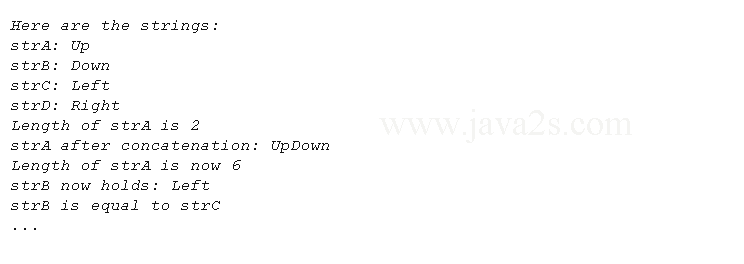Use strcpy(), strcat(), strcmp(), and strlen() for basic null-terminated string functions. - C++ Data Type
C++ examples for Data Type:char array
Description
Use strcpy(), strcat(), strcmp(), and strlen() for basic null-terminated string functions.
Demo Code
#include <iostream> #include <cstring> using namespace std; int main() {/*w w w. j a v a 2s .c o m*/ char strA[7] = "Up"; char strB[5] = "Down"; char strC[5] = "Left"; char strD[6] = "Right"; cout << "Here are the strings: " << endl; cout << "strA: " << strA << endl; cout << "strB: " << strB << endl; cout << "strC: " << strC << endl; cout << "strD: " << strD << "\n\n"; // Display the length of strA. cout << "Length of strA is " << strlen(strA) << endl; // Concatenate strB with strA. strcat(strA, strB); cout << "strA after concatenation: " << strA << endl; cout << "Length of strA is now " << strlen(strA) << endl; // Copy strC into strB. strcpy(strB, strC); cout << "strB now holds: " << strB << endl; // Compare strings. if(!strcmp(strB, strC)) cout << "strB is equal to strC\n"; int result = strcmp(strC, strD); if(!result) cout << "strC is equal to strD\n"; else if(result < 0) cout << "strC is less than strD\n"; else if(result > 0) cout << "strC is greater than strD\n"; return 0; }
Result
